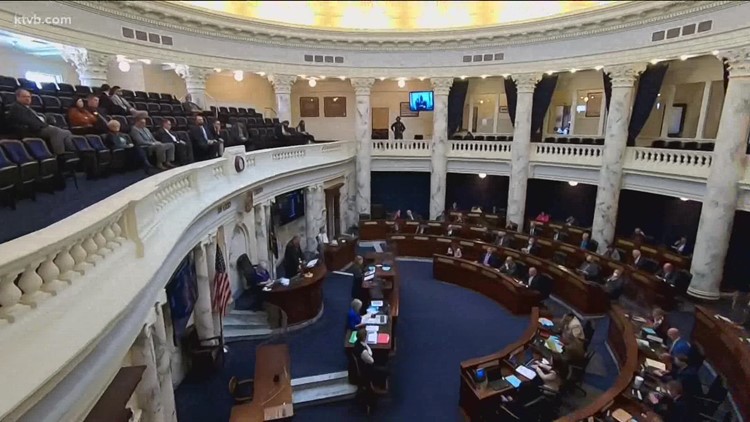BOISE, Idaho — Editor's note: This story originally appeared on the Idaho Press website.
In a turbulent day of lawmaking at Idaho’s newly reconvened legislative session on Monday, no new bills passed, and a top priority of GOP legislative leaders — allocating $2 million in state taxpayer money to a new legal fund to underwrite lawmakers intervening in federal vaccine lawsuits — was defeated.
Meanwhile, a House committee met into the night to slog through an array of anti-vaccine-mandate bills regarding employers; and a total of 36 bills were introduced Monday between the House and Senate.
“I think it’s going as well as can be expected,” House Speaker Scott Bedke, R-Oakley, said as the committee continued meeting well after 7 p.m.; its hearing started at 1:30. “There were a lot of ideas that were introduced and have bill numbers, and I think the committees will try to organize them.”
But nothing becomes law unless it passes both houses, he noted.
On Monday afternoon, the Joint Finance-Appropriations Committee voted 12-6 against HB 409, a proposal from Rep. Sage Dixon, R-Ponderay, to create a “Federal Overreach Legal Defense Fund” and fund it with a $2 million transfer from the state’s general fund.
The joint budget committee had lots of questions about the bill and its provisions, with many focusing on who decides to spend the money from the fund and how. Dixon said it would be entirely up to the House speaker and the Senate president pro tem.
The intent, Bedke and Senate President Pro Tem Chuck Winder said last week, is to have the Legislature intervene in multistate lawsuits to challenge the Biden Administration’s vaccine mandates, and pay its own private lawyers to argue specifically on behalf of the Legislature. Idaho already has joined two of those lawsuits, on vaccine requirements for federal contractors and on a proposed vaccine rule for private employers with 100 or more employees; the Idaho Attorney General’s offices is representing the state in those cases.
Bedke and Winder actually have already filed a motion to have the Legislature intervene in a multistate lawsuit in Kentucky over the Biden Administration’s vaccine mandates. That 13-page legal filing in the 6th Circuit U.S. Court of Appeals states, “The Speaker of the House and the Senate President Pro Tempore are authorized to represent their respective bodies in litigation pursuant to Article III, section 9 of the Idaho Constitution and the promulgated rules of each body. The Speaker of the House and the Senate President Pro Tempore, acting together, may assert interests belonging to the legislature as a whole.
It was filed on Nov. 10 by attorney Bill Myers of Holland & Hart, on behalf of Bedke and Winder.
The two legislative leaders already have sole control of the Legislative Legal Defense Fund, which has a current balance of more than $3.7 million.
Winder said Monday afternoon, “We still have the Constitutional Defense Fund, we still have a defense fund that’s available to the pro tem and speaker, and it was for all sorts of different costs.”
“Since it didn’t pass,” Winder said of the new $2 million funding bill, “we’ll have to take money out of the other fund for legal fees.”
Bedke said, “I would tend to agree with Sen. Winder.”
Winder said in addition to the filing he and Bedke already made in the 6th Circuit, “We’re in the process of probably filing in more than one.” Within “the next day or so,” Winder said, the two likely will file a similar motion in a case in Louisiana on health care facilities that receive federal Medicaid and Medicare funding.
Rep. Colin Nash, D-Boise, asked for the existing balances in the Constitutional Defense Fund and the Legislative Legal Defense Fund. Legislative Budget Director Keith Bybee reported the constitutional fund, which allows the governor along with the two top legislative leaders to decide on expenditures, has a balance of $1,133,249.24; and the legislative legal fund has a balance of $3,724,064.97.
Rep. Ron Nate, R-Rexburg, said, “We do have the ability to put more money into each of those funds.” Plus, he said, “We will be back in session in six weeks. ... There’s no reason to go spending more of the general fund on this. Let’s see how this goes.”
He noted that Idaho already is a party to two lawsuits over the Biden Administration’s proposed vaccine mandates, though other states have taken the lead.
JFAC Co-Chair Rick Youngblood, R-Nampa, said, “This is a public hearing. No one has signed up” to testify, but then he added, “I see a hand in the back.”
He called up that person, Ada County Commission Chairman Rod Beck. Beck told the joint committee that back when he was a state senator, he sponsored the legislation to create the existing Constitutional Defense Council. He said only one governor, Gov. Phil Batt, “used it for its intended purpose,” when he funded litigation against the federal government regarding nuclear waste.
“Ever since then, it’s been used as a sort of slush fund to pay legal fees,” Beck said. “You already have a fund that is established that does not violate the separation of powers,” because the Constitutional Defense Council, which approves expenditures from the Constitutional Defense Fund, includes the governor along with the House speaker and Senate president pro-tem.
Normally, appropriating state funds takes passage of an appropriation bill by the Legislature, and the signature of the governor agreeing to the bill.
Beck urged lawmakers to “just put ... money in the Constitutional Defense Fund and tell the Constitutional Defense Council to quit paying legal fees.”
He later clarified that he meant the fund should stop paying legal fees for cases the state lost, which is mainly what the fund has done; those largely have been court-ordered legal fees for the winning side in those cases.
Rep. Caroline Nilsson Troy, R-Genesee, said she wanted to “protect as much sovereignty as possible,” and moved to approve the bill, forwarding it to the House and Senate with a “do-pass” recommendation. Rep. Matthew Bundy, R-Mountain Home, seconded her motion.
The motion then failed on a 6-12 vote, with two absent. Here’s how the vote broke down:
Voting yes: Reps. Youngblood, Troy and Bundy; and Sens. Bair, Grow and Cook.
Voting no: Reps. Amador, Syme, Nate, Giddings, Nash, Horman and Green; and Sens. Woodward, Lent, Ward-Engelking, Nye and Crabtree.
Other bills introduced on Monday were assigned to various House and Senate committees. The Senate State Affairs Committee plans to meet at 8 a.m. on Tuesday for an “informational meeting only” on four measures targeting vaccine mandates or creating exemptions. The House State Affairs Committee, which had planned to meet Monday afternoon to consider seven bills assigned there, instead pushed its meeting off to 9:30 a.m. on Tuesday. And the House Judiciary Committee scheduled an 8:30 a.m. meeting Tuesday to consider one bill assigned there, HB 417, regarding vaccination requirements and workers compensation.
Monday started with a 7:30 a.m. meeting of the House Ways & Means Committee, which voted, on a single motion from House Majority Leader Mike Moyle, to introduce all 29 of the proposed bills on its agenda, with no discussion. Senate State Affairs followed suit a little over an hour later, introducing seven bills or resolutions with no discussion.
The House initially announced a whirlwind public hearing schedule for Monday afternoon on 17 proposed bills in three committees. But the first hearing, in the Business Committee, stretched all afternoon and into the evening, pushing off a planned State Affairs Committee meeting.
“I think that we were very lenient in introducing everybody’s ideas,” Bedke said, “so now every one of those bills is in the public domain,” and people can read and discuss them, he said.
“We’ll see what comes from the committees. There are some conflicting and overlapping” bills, he said. “That’ll be best sorted out in the committees with all the members.”
Asked whether the rushed schedule would allow time for adequate public input on the proposed laws, Bedke said, “These are not complicated bills. I believe the longest one is a couple of pages, and they’re pretty specific. So I believe that by the time we finish, the elected officials will have a good understanding of what the effect of a yes vote or a no vote is.”
Bedke said “the circumstances around this issue here” warranted the rushed schedule. “We needed to come in, close the books, take up the ethics report and while we’re here, we’ll take other urgent issues,” he said. “Yeah, we introduced a whole bunch of ‘em. We’re not going to speculate on what makes it through and what doesn’t.”
Nine bills on vaccine and testing mandates were assigned to the House Health & Welfare Committee, but that panel’s chair, Rep. Fred Wood, R-Burley, told Idaho Public Television on Monday afternoon that he won’t convene his committee.
Wood said he spent Monday afternoon in his office, reading the nine bills. Three hours later, he said, “I profoundly disagree with all nine of them.”
Wood, the only physician currently in the Idaho Legislature, said many of the proposals were poorly written, and he had philosophical disagreements with others. For example, HB 431, sponsored by Rep. Randy Armstrong, has language that would “supersede any conflicting rules or orders issued by local officials” and suspend “all relevant statutes.” That language is way too broad, and way too vague, Wood said.
Wood also said all of these issues could wait until January.
At the Business Committee hearing, extensive public testimony on the long list of bills, mostly featuring the same people on each bill, nearly all backed bans on vaccine mandates and included complaints that the proposed bills didn’t go far enough.
Kelly Williamson told the panel, “We the unvaccinated are not putting the vaccinated at risk.”
There’s no set length for this week’s unprecedented reconvening of the Idaho Legislature’s regular session, after what already ranked in May as the longest session in state history. Both Bedke and Winder, however, have said they want it to wrap up by Wednesday.
The House will convene Tuesday morning at 8 a.m.; the Senate at 10 a.m.
More from our partners at the Idaho Press: Senate minority fails in bid to short-circuit reconvened session
Watch more Idaho politics:
See all of our latest political coverage in our YouTube playlist:



